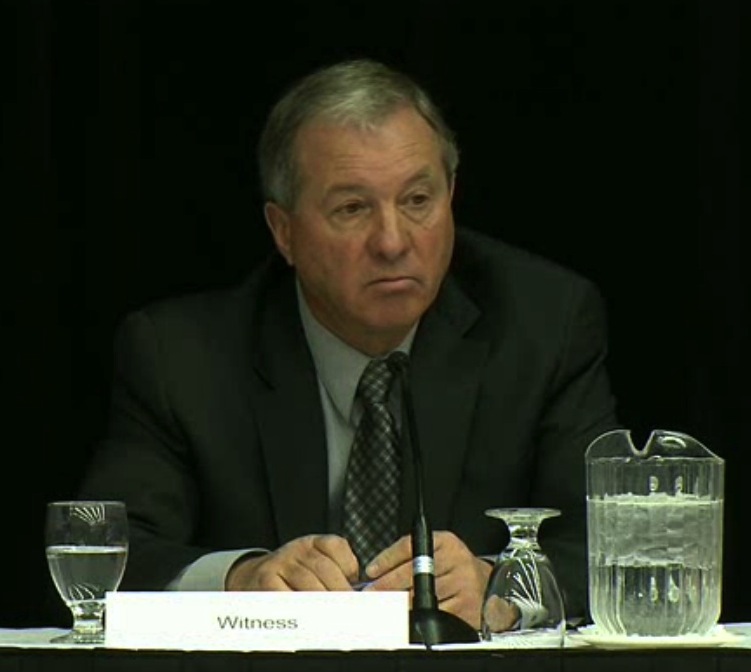Ron Liepert, Alberta’s outspoken Alberta health minister back in 2008 and 2009, once called the $10-million inquiry called by Premier Alison Redford’s Progressive Conservative government into preferential treatment in health care a waste of money.
And so it is … depending on how you look at it.
When Liepert was gently questioned for about an hour by the inquiry’s apparently uninquisitive counsel yesterday morning, he was deferential, confident, even friendly.
Like most of the other witnesses before him at the preferential-treatment inquiry that started a week earlier in Edmonton, Liepert had little memory of any attempts by people connected to the government to jump the line for treatment. And he was positive and direct enough about this to make it extremely hard to doubt the acuity of this particular witness’s memory.
Leastways, if there was a problem with line jumping, it’s said here it was unlikely to have been in the health minister’s office while Liepert occupied it.
Yup, Liepert told the inquiry led by retired justice John Vertes, he most certainly was aware that the Calgary Flames hockey team jumped the queue to get flu shots in 2009 when there was a shortage of the vaccine and tout le monde Alberta was in a swivet about because the H1N1 Apocalypse was apparently upon us. “I heard it on the radio,” he averred matter-of-factly. “I was shocked.”
Did he ever call to advocate on behalf of a member of the public, he was gently queried? “Nothing that I ever recall,” he responded confidently. “I highly doubt it and I certainly don’t remember doing anything like that.”
There was no need to pick one’s way through Edmonton’s mucky streets to see Liepert’s brief testimony, which lasted about an hour. Those foolish enough to want to watch could catch it on their computers, live-streamed via the Internet, with a background right out of an Ingmar Berman set. One kept expecting a church clock tower to loom out of the murk behind, or Death himself to walk past with a chessboard under his arm. Alas, no such dramatically Scandinavian moments occurred, notwithstanding the grim weather outside.
Whatever it was, yesterday’s session of the inquiry was no inquisition. The tone and urgency of the questions put to Liepert and Lynn Redford, Premier Redford’s sister and the day’s other star witness who followed him, was more like what you’d expect from a meditation class. You could almost hear the restful tinkling of water over rocks in the foyer and the gentle distant cry of migrating whales on the endless sound loop!
Redford, now an Alberta Health Service vice-president and back in the day a senior Calgary Health Region executive, couldn’t remember anything much. Speed up access for MLAs, their friends and relations, anyone? Nope. Sorry. Nothing like that ever happened.
“I’ve not been involved in adjusting wait lists of any sort, nor have I been involved in expediting access for anyone,” she stated emphatically in response to a polite question.
Inquiry counsel were almost weirdly passive, declining opportunities to aggressively follow up, accepting witnesses’ testimony without a peep of protest, asking closed questions that permitted answers like, “No.” Period.
And maybe that’s all there is to this — that is, nothing at all. In which case, Liepert got it right back in October 2011, didn’t he?
But you’d think counsel would exert themselves a little, if not for the sake of the show or to prove they’re earning their keep, just to be certain no stone was left unturned. Don’t they still teach this stuff in law school? If anyone was expecting fireworks, at any rate, they would have been broken hearted.
Indeed, the only testimony at the inquiry to date that points to a systemic effort to do end runs around the lineups in health care that seemed to be endemic in the late Zeroes came from a public clinic manager who said Monday physicians were the worst offenders, slipping staff, friends and family to the head of the line to try for for quick consults.
And to think it was the docs who demanded an inquiry — into something completely different, of course; that is, intimidation of health care professionals like themselves by health bureaucrats and government officials.
Well, they got an inquiry from this government, didn’t they? The message here may well be, be careful what you wish for, you might just sort of get it!
Which brings us back again to Liepert’s suggestion last year this narrow, limited and in-no-way independent inquiry was not likely to deliver value for taxpayers’ money. This might not be quite true if you look at it from the government’s perspective.
Given the limits on where it can go, it’s highly unlikely this process will uncover anything embarrassing to the Alberta government. Indeed, at the risk of sounding cynical, if there had been much risk of that, it wouldn’t have been called.
But given the brouhaha about waiting lines seems to have settled down, whatever harmless findings this inquiry turns up may well be quite happily accepted by the public.
In which case, from the government’s perspective, it will have been a very good investment indeed.
This post also appears on David Climenhaga’s blog, Alberta Diary.



